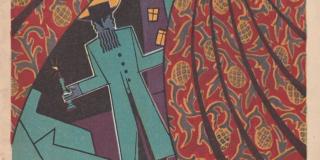
“The God of Vengeance”
“The God of Vengeance”: Is the Play Immoral? — Is it a Great Drama? Read what Frank Crane and others say
New York: Apollo Theatre, 1923
The prominent Yiddish playwright Sholem Asch (1880–1957) wrote God fun nekome (The God of Vengeance) in 1907, a work that is widely recognized as one of the most compelling and beloved Yiddish plays of all times. It is celebrated for its dramatic plot, love story, striking openness, conflict of values, and profound morality. At the core of the play is a story set in an unidentified provincial Jewish town in Poland at the then-present time. It unfolds at the brothel owned by a Jewish couple (Yankl and his wife, Sarah) who are trying to shield their innocent teenage daughter Rivkele from the environment in which she already resides. But her parents’ hopes collapse when they discover that their only daughter has fallen deeply in love with the prostitute Manke from the brothel.
Many fundamental moral issues were raised not only about the drama itself but also around staging it. For many years, the play enjoyed great popularity in Europe in original Yiddish, as well as in German and Russian, and was translated into many languages. Its English-language American premiere, starring the famous Austrian Jewish actor Rudolph Schildkraut (1862–1930) as Yankl, took place on Broadway in December 1922 with overwhelming success. The play’s acclaim was on the rise when, in March 1923, the producer Harry Weinberger and the cast were suddenly indicted and brought to court for staging what was deemed an insulting, immoral drama. Weinberger, who was also an attorney, mobilized leading playwrights and theater personalities of diverse backgrounds, including many American luminaries, including Frank Crane (1861–1928), an influential writer and clergyman, in defense of the play. Weinberg’s powerful advocacy, which included a statement from Asch, resulted in the brochure you see here. It defended the play, challenging the hypocrisy of society and its religious morality, thus underscoring the revolutionary significance of Asch’s creation. While the charges were ultimately dropped, the fact of indictment stands as a testament of profound conflicts within the Jewish immigrant community and the American society in general at that time.
The cover page of the pamphlet boldly identifies critical questions about the morality of the play, mentions the Apollo Theatre on Broadway, and features a photograph of Schildkraut.
The New York Public Library believes that this item is in the public domain under the laws of the United States, but did not make a determination as to its copyright status under the copyright laws of other countries. This item may not be in the public domain under the laws of other countries. Though not required, if you want to credit us as the source, please use the following statement, "From The New York Public Library," and provide a link back to the item on our Digital Collections site. Doing so helps us track how our collection is used and helps justify freely releasing even more content in the future.






